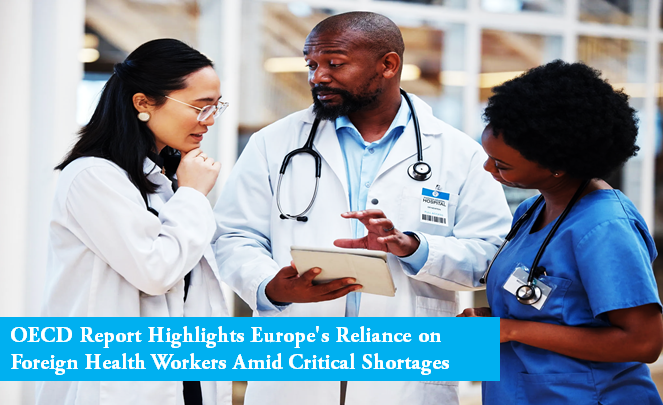Dublin: A recent OECD report has revealed that European countries facing severe shortages of healthcare workers are heavily dependent on foreign-trained professionals. The report highlights a significant shortfall of doctors and nurses in various nations, stressing that these gaps can only be filled by recruiting healthcare professionals from abroad.
Need for Domestic Training
The OECD warns that unless European countries prioritise the training of their own doctors and nurses, they will remain reliant on foreign workers in the long term. Countries such as Germany are expected to require an additional 150,000 nurses by 2025. To address this issue, the report advocates for improved working conditions, competitive wages, and robust retention strategies, which are crucial to preventing further shortages in the healthcare workforce.
Impact on Expatriates and Foreign Worker Contributions
The shortage of healthcare professionals not only affects European citizens but also has significant implications for expatriates living in Europe. In countries like Norway and Switzerland, more than 40% of doctors are foreign-trained, underscoring the critical role of international workers. Similarly, Ireland is heavily reliant on foreign healthcare professionals, particularly nurses, to meet its healthcare demands.
While foreign recruitment helps alleviate staffing shortages in Europe, it creates significant challenges in the countries supplying these healthcare workers. For example, Albania has lost 3,500 doctors over the past decade, according to the Federation of Albanian Doctors in Europe. Romania and Poland are also facing severe understaffing crises as healthcare professionals from these regions migrate to wealthier nations such as Germany and the UK.
The report points out that 45% of foreign-born nurses prefer to work in the U.S., with Germany (15%) and the UK (11%) being other popular destinations. The movement of healthcare workers from Eastern and Southern Europe to Western and Northern Europe is creating acute gaps in the healthcare systems of the originating countries.
ESRI Research on AI and Emerging Technologies
In related news, a recent study by Ireland’s Economic and Social Research Institute (ESRI) highlights employers’ concerns about the availability of skilled graduates in fields such as artificial intelligence (AI), automation, and blockchain. The report, funded by the Department of Further and Higher Education, Research, Innovation, and Science, notes that universities in Ireland are increasingly producing graduates with expertise in these emerging fields. However, employers are cautious about hiring technical graduates, citing the need for policy changes to accommodate the evolving demands of the labour market.
The research, which utilised data from various sources, including online vacancy monitoring and employer workshops, predicts that the recent European Artificial Intelligence Act will further increase demand for skilled workers in AI-related roles. Minister for Higher Education and Research, Patrick O’Donovan, welcomed the report, noting that it would help shape future policies. Dr. Seamus McGuinness, one of the report’s authors, emphasised the importance of companies developing strategies to manage AI-driven changes across various sectors.
Irish Samachar English News
{OR} Kindly click to follow the Irish Samachar News channel on WhatsApp

